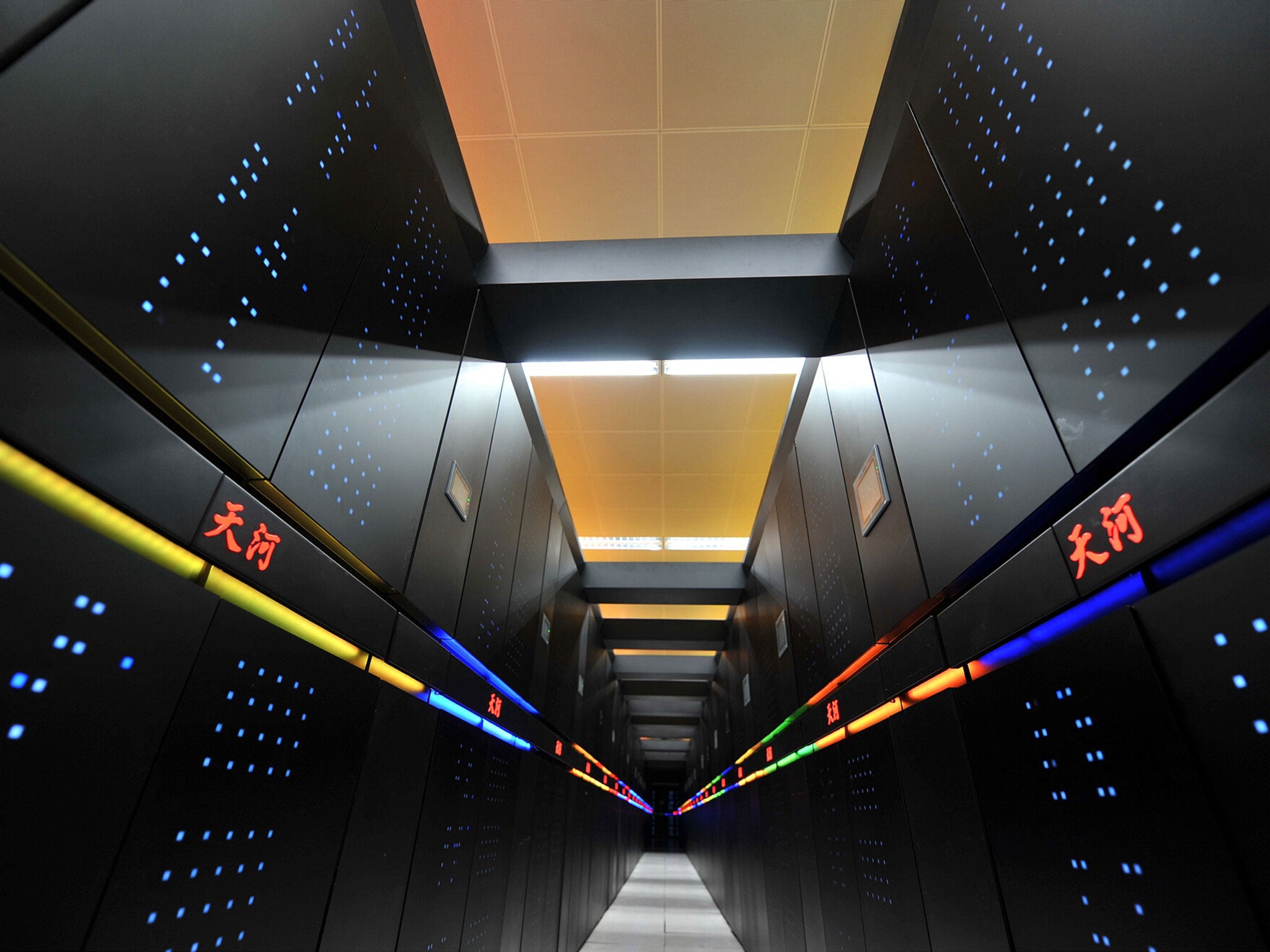China creates fastest computer in the world, challenging US dominance in making supercomputers
The computer can make about a quadrillion calculations a second, according to its makers

Your support helps us to tell the story
From reproductive rights to climate change to Big Tech, The Independent is on the ground when the story is developing. Whether it's investigating the financials of Elon Musk's pro-Trump PAC or producing our latest documentary, 'The A Word', which shines a light on the American women fighting for reproductive rights, we know how important it is to parse out the facts from the messaging.
At such a critical moment in US history, we need reporters on the ground. Your donation allows us to keep sending journalists to speak to both sides of the story.
The Independent is trusted by Americans across the entire political spectrum. And unlike many other quality news outlets, we choose not to lock Americans out of our reporting and analysis with paywalls. We believe quality journalism should be available to everyone, paid for by those who can afford it.
Your support makes all the difference.A Chinese supercomputer is the world’s fastest – and uses only Chinese technology for the first ever time.
The announcement shows the fast development of Chinese supercomputers and is a demonstration of the way that the US – once easily the dominant force in making massively powerful computers – is getting challenged.
China also displaced the US as the country with the most supercomputers in the top 500 ranking of the most powerful computers in the world. China had 167 systems and the United States had 165. Japan was a distant No. 3 with 29 systems.
Although Chinese computers have topped the ranking before, this year marks the first that the computer that did so was entirely using Chinese chips.
Last year's Chinese winner in the TOP500 ranking maintained by researchers in the United States and Germany slipped to No. 2, followed by a computer at the U.S. government's Oak Ridge National Laboratory in Tennessee.
Supercomputers are one of a series of technologies targeted by China's ruling Communist Party for development and have received heavy financial support. Such systems are used for weather forecasting, designing nuclear weapons, analyzing oilfields and other specialized purposes.
"Considering that just 10 years ago, China claimed a mere 28 systems on the list, with none ranked in the top 30, the nation has come further and faster than any other country in the history of supercomputing," the TOP500 organizers said in a statement.
This year's champion is the Sunway TaihuLight at the National Supercomputing Center in Wuxi, west of Shanghai, according to TOP500. It was developed by China's National Research Center of Parallel Computer Engineering & Technology using entirely Chinese-designed processors.
The TaihuLight is capable of 93 petaflops, or quadrillion calculations per second, according to TOP500. It is intended for use in engineering and research including climate, weather, life sciences, advanced manufacturing and data analytics.
Its top speed is about five times that of Oak Ridge's Titan, which uses Cray, NVIDIA and Opteron technology.
Other countries with computers in the Top 10 were Japan, Switzerland, Germany and Saudi Arabia.
The TaihuLight is due to be introduced Tuesday at the International Supercomputing Conference in Frankfurt by the director of the Wuxi center, Guangwen Yang.
"As the first No. 1 system of China that is completely based on homegrown processors, the Sunway TaihuLight system demonstrates the significant progress that China has made in the domain of designing and manufacturing large-scale computation systems," Yang was quoted as saying in the TOP500 statement.
The TaihuLight uses Chinese-developed ShenWei processors, "ending any remaining speculation that China would have to rely on Western technology to compete effectively in the upper echelons of supercomputing," TOP500 said in a statement.
The second-fastest computer, the Tianhe-2 at the National Supercomputer Center in the southern city of Guangzhou, is capable of 33 petaflops. It uses chips made by Intel Corp.
Among countries with the most computers on the top 500 list, Germany was in fourth place with 26 systems, France was next with 18, followed by Britain with 12.
Additional reporting by Associated Press
Join our commenting forum
Join thought-provoking conversations, follow other Independent readers and see their replies
Comments